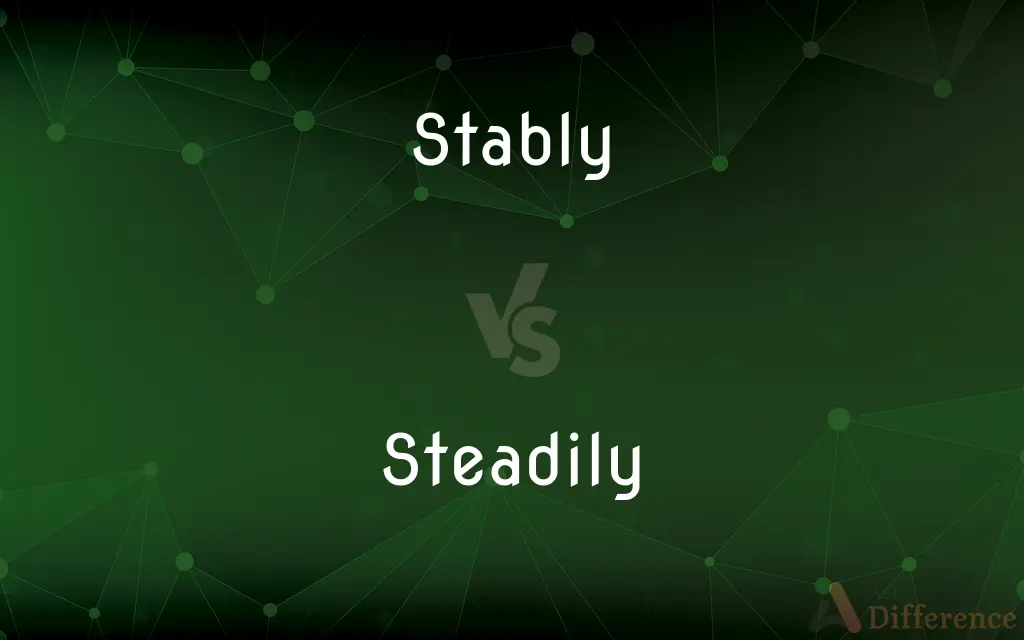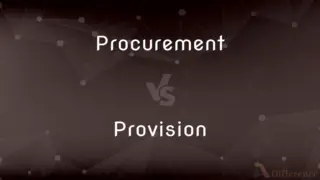Stably vs. Steadily — What's the Difference?
By Tayyaba Rehman & Maham Liaqat — Updated on April 22, 2024
Stably implies a condition of being firm and unchanging, while steadily suggests a gradual, consistent progression or movement.

Difference Between Stably and Steadily
Table of Contents
ADVERTISEMENT
Key Differences
Stably refers to maintaining a fixed state or condition without variation or fluctuation, often implying robustness or resistance to change. On the other hand, steadily denotes a smooth, continuous, and gradual movement or development, emphasizing consistency over time.
In contexts involving emotional or psychological conditions, being stable suggests a person remains constant and unaffected by external changes, while steadily can describe someone improving or deteriorating at a consistent rate.
When discussing structures or systems, stably highlights the reliability and solidity of an object or system that remains unaffected by disturbances. Conversely, steadily might be used to describe the rate of growth or decline in efficiency or capacity over time.
Financial discussions often use stable to describe an economy, market, or currency that is resistant to sudden changes or shocks. Meanwhile, steadily is frequently applied to economic growth or inflation rates that progress at a predictable, moderate pace.
In scientific or technical settings, stably can be used to describe an equilibrium state or a system that does not deviate from its baseline conditions. Whereas, steadily might be used to describe the rate of a chemical reaction or the gradual increase in temperature or pressure in a controlled experiment.
ADVERTISEMENT
Comparison Chart
Definition
Fixed, unchanging state
Gradual, consistent progression
Usage in context
Emotional or psychological state
Improvement or deterioration rate
Pertinence in systems
Reliability and solidity
Growth or decline rate
Economic implications
Resistance to changes or shocks
Predictable, moderate growth rate
Scientific applications
Equilibrium state
Rate of change in conditions
Compare with Definitions
Stably
Unchangingly, without fluctuation.
His mood has been stably content all week.
Steadily
Reliably, predictably.
The company's profits have grown steadily each quarter.
Stably
Firmly and securely.
The structure stands stably despite harsh weather.
Steadily
Without interruption, continuously.
The rain fell steadily all night.
Stably
Securely, without risk of change.
The treaty has held the peace stably for decades.
Steadily
At a constant rate.
She progressed steadily through the ranks.
Stably
Reliably, in a dependable manner.
The software operates stably across various platforms.
Steadily
Gradually, without abrupt changes.
He steadily improved his stamina with daily runs.
Stably
Constantly, without interruption.
The production has run stably for several months.
Steadily
Firmly, without swerving.
He walked steadily towards the stage.
Stably
Resistant to change of position or condition; not easily moved or disturbed
A house built on stable ground.
A stable platform.
Steadily
Firm in position or place; fixed.
Stably
Not subject to sudden or extreme change or fluctuation
A stable economy.
A stable currency.
Steadily
Direct and unfaltering; sure.
Stably
Maintaining equilibrium; self-restoring
A stable aircraft.
Steadily
Free or almost free from change, variation, or fluctuation; uniform
A steady increase in value.
A steady breeze.
Stably
Enduring or permanent
A stable peace.
Steadily
Not easily excited or upset
Steady nerves.
Stably
Consistent or dependable
She has been stable in her support for the project.
Steadily
Unwavering, as in purpose; steadfast.
Stably
Not showing or marked by erratic or volatile emotions or behavior
He remained stable even after he lost his job.
Steadily
Reliable; dependable.
Stably
(Physics) Having no known mode of decay; indefinitely long-lived. Used of atomic particles.
Steadily
Temperate; sober.
Stably
(Chemistry) Not easily decomposed or otherwise modified chemically.
Steadily
To make or become steady.
Stably
In a stable manner.
Steadily
Used to direct a helmsman to keep a ship's head in the same direction
Steady as she goes!.
Stably
A medieval hunting practice in which a group of hunters and hounds are stationed around the perimeter of a wood during a hunt to prevent the escape of the game.
Steadily
The person whom one dates regularly, usually exclusively.
Stably
In a stable manner; firmly; fixedly; steadily; as, a government stably settled.
Steadily
In a steady manner; with a steady progression.
Stably
In a stable solid fixed manner;
The boulder was balanced stably at the edge of the canyon
Steadily
In a steady manner.
Stably
In a stable unchanging manner;
The death rate in Russia has been stably high
Steadily
At a steady rate or pace;
His interest eroded steadily
Steadily
In a steady manner;
He could still walk steadily
Common Curiosities
How does stably differ from statically?
Stably means being firm and unchanging, whereas statically refers to a lack of movement or change.
What does stably mean in a scientific context?
In science, stably refers to conditions or systems that maintain their state or equilibrium without deviation.
Can steadily imply instability?
Steadily implies a smooth, consistent progression, so it generally does not suggest instability but a regular pace of change.
Is it possible for something to be both stable and steady?
Yes, a process or system can be both stable (unchanging in state) and steady (progressing at a consistent rate).
Which term is better for describing economic growth?
Steadily is more appropriate for describing the nature of economic growth, which typically occurs at a consistent, progressive rate.
Can an object be stably unstable?
This would be a contradiction, as stable implies consistency and predictability, while unstable implies the opposite.
How do you describe a chemical reaction that proceeds without fluctuating?
Such a reaction can be described as proceeding stably, indicating no variation in its progress.
What does it mean for a company to operate stably?
It means the company maintains its operations without major interruptions or fluctuations.
How would you describe the growth of a plant in scientific terms?
A plant grows steadily if its growth rate is consistent and gradual.
What does steadily imply in terms of performance?
It implies consistent, gradual improvement or progression in performance.
Can a person's mood be described as steadily happy?
While unusual, it could imply a continuous, gradual improvement in mood, though "stably happy" might be more common to indicate persistent happiness.
Share Your Discovery

Previous Comparison
Travel vs. Commute
Next Comparison
Procurement vs. ProvisionAuthor Spotlight
Written by
Tayyaba RehmanTayyaba Rehman is a distinguished writer, currently serving as a primary contributor to askdifference.com. As a researcher in semantics and etymology, Tayyaba's passion for the complexity of languages and their distinctions has found a perfect home on the platform. Tayyaba delves into the intricacies of language, distinguishing between commonly confused words and phrases, thereby providing clarity for readers worldwide.
Co-written by
Maham Liaqat















































